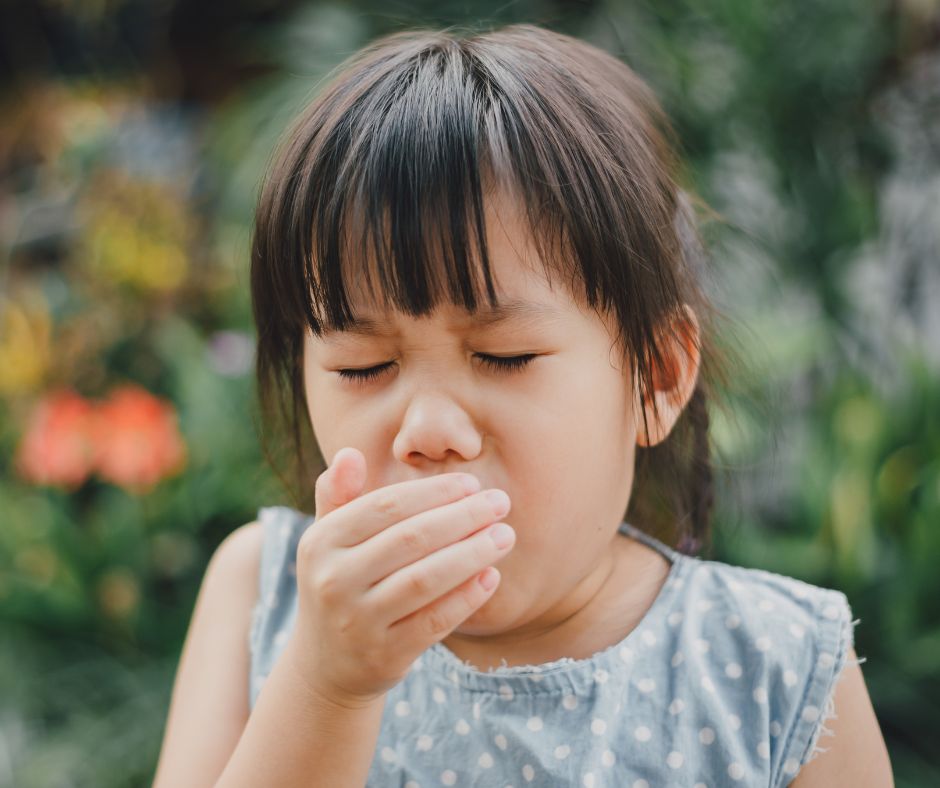We all know those red, itchy eyes and runny nose signal the start of allergy season. But when a nagging cough joins the mix, you may feel a bit confused. Can allergies still be to blame, or does a cough signal something more serious – or even contagious?
The simple answer is yes, allergies can indeed trigger a persistent cough (as well a host of other uncomfortable symptoms.) Understanding the connection between allergies and coughing, identifying an allergy-induced cough, and knowing the steps to manage it are essential in finding relief.
Why Do Allergies Make You Cough?
Allergies are an overreaction of your immune system to normally harmless substances such as pollen, dust, or pet dander. When these particles enter your respiratory system, the body perceives them as threats, releasing histamines to combat the perceived invaders. These chemicals cause inflammation, swelling, and excess mucus production in the airways – all directly to blame for your allergy symptoms.
An allergy cough may be caused by:
- Postnasal Drip. When you breathe in an allergen, your nasal passages secrete excess mucus to flush away the particles. Some of this mucus creates that hallmark runny nose, but it may also drain down the back of your throat. This causes irritation and triggers a cough reflex.
- Dry Throat. When your nose is runny or congested, you’re more likely to breathe through your mouth. Mouth breathing dries out your throat and airway passages, which can also trigger the urge to cough.
- People with asthma often find that seasonal allergies exacerbate their symptoms, including coughing.
How to Identify an Allergy Cough
An allergy cough can be distinguished from other types of coughs by a few key characteristics. If you’re wondering if your cough is allergy-related, start by asking yourself a few questions:
- When did it start? Allergy coughs usually come on quickly after exposure to an allergen. Coughs caused by cold or flu viruses are typically gradual in onset.
- How does it sound? Most allergy coughs are dry and may have a “barking” sound. Wet, productive coughs are often a sign of some other issue.
- What are your other symptoms? An allergy cough will be accompanied by other allergy symptoms such as a runny nose, itchy eyes and throat, and sneezing. If you have a fever or severe body aches, it’s time to see a doctor.
- How long has it lasted? Allergy coughs are extremely persistent, usually lingering for weeks or even months at a time. If you’ve had a chronic dry cough for at least three weeks, allergies are probably to blame.
How to Treat an Allergy Cough
Treatment for an allergy cough focuses on addressing the underlying allergies. Over-the-counter antihistamines and nasal sprays can provide temporary relief by blocking histamine action and opening your airways. Lifestyle changes like adding a home air purifier, keeping doors and windows closed, and sleeping with a humidifier can also be helpful in reducing symptoms.
For a more lasting solution, immunotherapy through sublingual allergy drops offers a promising avenue. These drops are designed to gradually desensitize your immune system to allergens, reducing the severity of your reactions over time. By targeting the root cause of your allergies, sublingual allergy drops can significantly diminish, or even eliminate, your allergy cough and other symptoms.
America’s Best Care Plus specializes in sublingual allergy drops for immunotherapy, providing a convenient and effective solution right at your doorstep. Say goodbye to persistent coughing and hello to clearer, more comfortable days ahead. Discover more about our sublingual allergy drops and how they can help you achieve lasting relief from allergy symptoms, including that troublesome cough. Visit us online today and take the first step towards a life free from allergy-induced discomfort.

